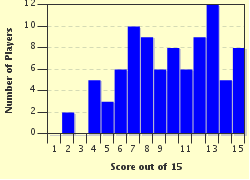Quiz Answer Key and Fun Facts
1. Hannibal lived in Carthage in the second century B.C.E. What was the conflict that he waged against mighty Rome called?
2. Although Hannibal is most famous for marching an army over the Alps, which other European mountain range did he take them over?
3. The battle of Lake Trasimene (217 BCE) was one of Hannibal's great battles of the Punic War. What strategy did he use to win?
4. After General Publius Cornelius Scipio's humiliating defeat, his nephew took over (whom had the same name). What did Scipio the Younger do to get Hannibal's forces out of Europe?
5. As all lives do, Hannibal's finally came to an end. How did this great warrior and military strategist die?
6. Spartacus! Although Spartacus is most famous for being a gladiator, a rebel and marching an army around Italy, terrorizing the Romans, where was he thought to be originally from?
7. Although gladiators were considered entertainers, they were still slaves and therefore not free to do what they wanted. They weren't even allowed to use real weapons, only wooden ones! Spartacus and two other leaders decided to break the gladiators out of the school. The problem was weapons. What did they use to fight?
8. When they received the news in Rome, an army was sent out to end the slave revolt. The mountain the slaves were camped on was steep and slippery except for one path up, which the Romans conveniently blocked with their army. Safe in the knowledge that Spartacus was trapped, they went to sleep. But the slaves weren't trapped. What tactic did they use to ambush the Romans?
9. Spartacus and his army spent the next few months "touring" Italy, gathering recruits, robbing, pillaging, terrorizing and even defeating more Roman armies and legions. Eventually one man decided that enough was enough, he would go and sort out the rebels himself, with not one, not two, but ten legions. Who was he?
10. Remember Gnaeus Pompeius Magnus?Well Pompeius went after all the fleeing slaves and brought many of them back. That done, he gave the slave revolt its final crushing blow. What did he do to the captured slaves?
11. Last, but not least, we come to our good friend the King of the Huns. You probably know him as Attila the Hun, but what nickname did he get?
12. In the 5th century CE Rome was on the decline, so Attila and Bleda had inherited the opportunity to attack a huge empire. One of their first acts as kings was to establish a peace treaty with what empire?
13. As if attacking the East wasn't enough (he did it again in 447), Attila decided to fight his former ally, Valentinian III, in the West. However "love was in the air" during this encounter, as Attila's marriage proposal was part of the conflict. Who was the "lucky lady"?
14. Earlier we heard about one of our other villains (or heroes- take your pick) crossing a mountain range, and it turns out that Attila did the same thing. What was the name of the mountain range?
15. As all people do, eventually Attila died. On which special occasion did he die?
Source: Author
quiz4759754
This quiz was reviewed by FunTrivia editor
bloomsby before going online.
Any errors found in FunTrivia content are routinely corrected through our feedback system.

